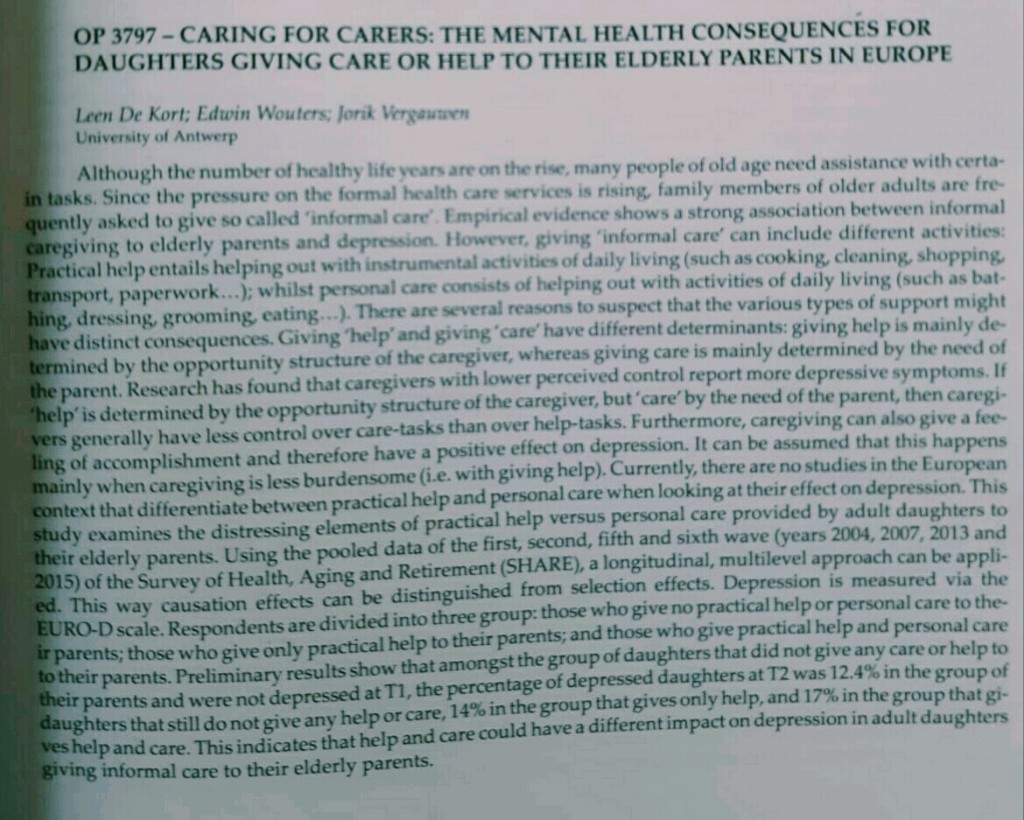This month we are pleased to host an in-depth interview in our journal conducted together with Dr. Leen De Kort, researcher at the University of Antwerp. Together with her, we discussed the topic of ageing and infomal care.
1) Who is Dr. Leen De Kort?
I graduated as a health sociologist at the University of Ghent (Belgium) in 2011. After further exploring the field of health studies, getting a teaching degree, and holding several jobs as a researcher, I decided to start a Phd at the University of Antwerp. There I work for the Research Centre for Longitudinal and Life Course Studies, and currently I focus on intergenerational solidarity. Informal caregiving from children to their elderly parents is an important aspect of this research field.
2) Informal caregiving; how to define it shortly, and who are the beares of this burden/resource?
Informal caregivers, as defined by the WHO, are people who take up care tasks, without being paid for this work, and without being part of an organisation whose services can be hired. Family members, but also friends or neighbours can be informal caregivers. In the case of elderly care however, partners, adult children and children-in-law are most likely to become informal caregivers. Since I am interested in intergenerational solidarity, I focus on informal care given by adult children to their parents.
3) You distinguish between two kind of caring: Could you define them, in their activities?
Informal caregiving consists of a wide range of activities: from handling administrative paperwork to picking up some groceries or helping your parents groom themselves. In general, the WHO distinguishes two big categories: The first category is help with activities of daily living (ADL’s), often referred to as help with personal care. This type of care consists of help with basic activities that are necessary to independent living, such as eating, bathing and toileting. The second category includes helping with activities with aspects of cognitive and social functioning, called instrumental activities of daily living (IADL’s). Such activities include cooking, doing housework, managing money and using the telephone. Help with these activities is often referred to as instrumental help.
4) You have found a possible correlation between depression of the caregiver (mainly women?) and doing no caregiving at all, or doing one kind of caring, or two… Could you explain?
Previous research found that giving informal care can be detrimental for a caregivers’ mental health. It is however not entirely clear yet in which circumstances this is true. In my own research about the impact of informal caregiving on the mental health of adult children caring for their parents, I try to get a clearer view on these circumstances. Our preliminary results suggest that not only care intensity, but also the type of care one gives is important when looking at mental health. When giving intense informal care, giving personal care seems to result in more depressive symptoms compared to giving instrumental help or not giving care. However, our study is not finished yet. These results need to be put into context. We know for example that more women than men give informal care to parents. It is therefore necessary to investigate how this influences the results of our study.
5) You have used mainly statistical tools to measure depression. Did you use also narrative tools, or ethnographic sources? Could you comment on this? If you never used narrative research, would you like to go for it, to better understand and to interprete the data?
So far I only used statistical tools to research the relationship between informal caregiving and mental health. I am however working with a mixed-method design. That means that in a second stage, I will conduct interviews with children giving informal care to their parents. This will allow me to put the results from my quantitative research into perspective, but I will also enable me to incorporate certain dimensions that can’t be looked at with survey data.
6) What is the advice to give to policy makers to help not only the elderly but also the “caregivers” to “protect themselves”?
Since the pressure on the formal health care services is rising, family members are more and more often asked to step in. Since this can be detrimental for their mental health, it is important that Long Term Care Services do not longer only focus on the elderly themselves, but that they start seeing their caregivers as an important target group. However, to design efficient policy, we first need to find out in which circumstances caregiving is most likely to negatively influence one’s mental health.
Lastly, we offer our readers the opportunity for an interesting in-depth analysis of the issues dealt with. A short abstract of a scientific publication by Leen De Kort on mental health and informal care:

